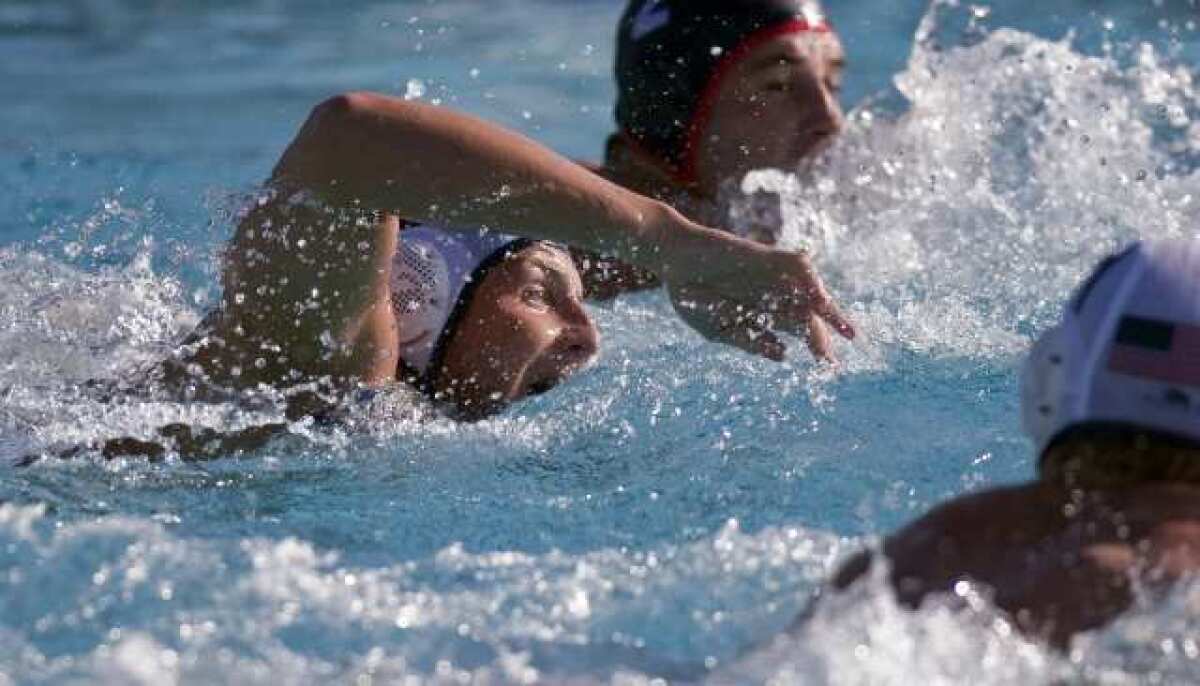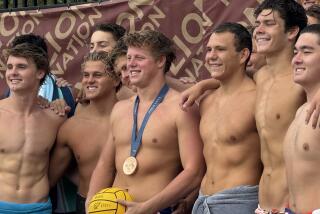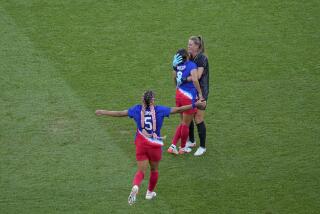London Olympics: Ryan Bailey, Tony Azevedo are water polo partners

- Share via
LONDON – As Ryan Bailey recalls it, he was an 8- or 9-year-old commencing a now decades-long affair with water polo and he would peek to the side of the pool where the coach’s kid stood alone, throwing a ball against a wall.
As Tony Azevedo recalls it, it was a few years later when he actually jumped in that pool at Long Beach State, and most notably a then-teenage Bailey predictably threw around the interloper much like Azevedo used to toss that ball idly to himself.
“I’ve known Tony since he was a baby,” Bailey said Friday. “We’ve been around for a while.”
Just not much longer, at least not together competitively, which infuses a streak of urgency into the U.S. men’s water polo efforts that commence Sunday.
Bailey’s fourth Olympics likely will be his last. That permanently will dock a partnership with Azevedo that is 14 years old and helped produce the U.S.’s first Olympic medal in water polo in 20 years, and that renders the team captain both a bit wistful and a bit more determined.
“I’m just enjoying this moment, because this will be the first time after this year that I’ll have to play without guys like Ryan that I’ve grown up with my entire life and looked up to,” Azevedo said. “I want to let these guys finish their careers with a gold medal and enjoy these last eight games. To me, that’s what’s special about this Olympics.”
The connection always has been there: Azevedo’s father, Ricardo, was the local age group coach in Long Beach, Calif., when Bailey began playing the sport. It truly began to blossom when Bailey finished at UC Irvine and joined the national team, with Azevedo again lingering on the fringes as a promising teenager.
As the team’s young guys then – despite the six-year age difference – Azevedo and Bailey would dine together and absorb the punishment from the veterans. Then they began to make things their own, as early as one of Azevedo’s first trips to the world championships.
“He caught the ball, dropped to the water, kicked the ball over the defender’s head, went inside and scored a really nice goal,” Bailey said. “From then, it was like, ‘Oh yeah, we got something special here.’”
While Bailey jokes that there is no cord to cut – “We’re married, we have separate lives,” he pointed out – the link is strong. Especially given the silver medal in Beijing, which was the first U.S. water polo medal in two decades.
“We’ve been on the same team, playing every day together for 14 years,” Bailey said. “There’s nobody I’d rather play with, for sure. He passes the ball to me the best out of anybody. It’s awesome. He does it all. It makes my job easier and makes me look good.”
The quest for a gold medal is considered rugged but plausible. Coach Terry Schroeder told his team in the first meeting in London to exude calm and confidence as if it had won the gold already. Goalkeeper Merrill Moses flatly said the motivation was to become “the best team, ever” with a finish at the top of the podium.
Azevedo, who scored 17 goals in Beijing and is among the world’s best, sees it as nothing more than a fitting ending.
Bailey “is definitely one of my closest friends and it’s going to be sad, for sure, playing without one of the best [centers] in the world for the first time in my career after this Games,” Azevedo said. “We’re here to give it a shot.”
ALSO:
USOC fires back at Olympic political ad
Will the Queen light the London Olympics torch?
More to Read
Go beyond the scoreboard
Get the latest on L.A.'s teams in the daily Sports Report newsletter.
You may occasionally receive promotional content from the Los Angeles Times.






